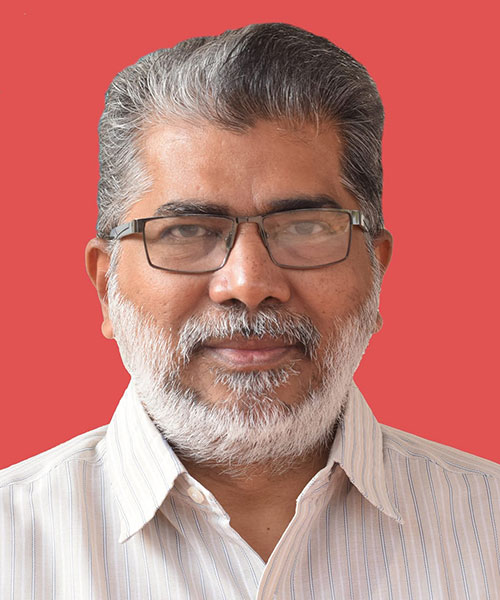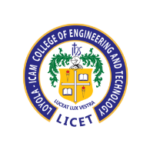OFFICIAL'S DESK
Provincial’s desk

JESUIT CHENNAI PROVINCE
Fr Britto was born in 1960 and entered the Society on 8 July 1980. He was ordained a priest in 1991 and pronounced his Final Vows on 4 August, 2002. His pastoral and academic work spans several years. Following his supervised pastoral ministry in CK Mangalam (Sivangangai Diocese), he served in the office of Culture and Communications, Loyola College, Chennai, from 1992 to 1995. He then joined St Xavier’s College, Palayarnkottai, where he taught folkloristics for 18 years from 2001, and served as Director of the Folklore Resources and Research Centre, St Xavier’s College, for five years.
Fr Britto has held several leadership roles, including as Rector of St. Xavier’s Institutions, Palayamkottai (2007–2013); Vice-Superior of John Peter Leonard Campus, Kasthambadi (2023–2025); Principal of St Xavier’s College, Palayamkottai (2016–2019); Principal of Loyola College, Vettavalam (2019–2022); and Province Coordinator for Formation, Madurai Province (2014–2016). He has also done a lot of work in Street Theatre, Folk Performing Arts, Ethnomusicology, Counselling and Retreat Direction.
Prior to his appointment as Provincial, Fr Britto served as the Socius to the Provincial of the Chennai Province.
Fr. Britto Vincent
Rector’s Desk
‘All for the greater glory of God’ is the sole purpose of the Society of Jesus. The Society of Jesus was founded in 1540 by St Ignatius of Loyola with the approval of Pope Paul III. St Ignatius of Loyola had gathered around him an energetic band of well-educated men who desired nothing more than to help others find God in their lives. It was Ignatius’ original plan that the Jesuits be travelling missionaries who would preach and administer the people wherever there was the hope of accomplishing the greater good. Since its foundation the Order has grown from the original ten to more than 15,000 Jesuits worldwide.
From the very beginning, the Society of Jesus served the people of God in Europe as well as in Asia, Africa and the Americas. Saints like, St Francis Xavier, St John de Britto, and so many holy people have spearheaded the mission of the people of God in India and all over the world. Courageous missionaries like Robert de Nobili, Peter Claver, Roch González, Jean de Brébeuf, and Eusebio Kino brought the good news to the ends of the earth.
Very soon after the foundation of the Society the Jesus, it became clear to St Ignatius of Loyola that education offered the greatest possible service to the young and by teaching the message of service to others. And so, many educational institutions began to be founded. Jesuit institutions focus on the integral formation of individuals with academic, spiritual and human values. The “Ratio Studiorum” or “Guide to Education” evolved by the Jesuits in 1599 remains as a universal code for education.
Loyola – ICAM College of Engineering and Technology is a new venture of the Jesuits of Chennai Province to make technical education accessible to all without compromise on academic excellence. LICET nurtures building industry–institution interface. The institute creates an atmosphere for the over-all growth of students. LICET, with excellent infrastructure, is making all genuine efforts to form engineers to engineer a just society.
Rev. Dr. Antony Robinson, SJ.


Director’s Desk
The Jesuit education requires an all-encompassing deeper formation of the entire human person. It is an educational process of human formation that calls for excellence – a striving to excel or to achieve one’s full potential. This goal encompasses the physical, spiritual, emotional, intellectual, social and more. It calls for a human excellence that reflects and ensures the dignity of all people as well as the holiness of all creation. The Jesuits, being men of God and men for the others, with a relentless intellectual vigor and indomitable courage continue their noble mission even at this era of Computer or the AI boom.
In the recent days, the new Chennai Jesuit Province is a feather in the cap, displaying the resilience of the Society of Jesus. Inspired with a motive to impart quality technical and engineering education to the marginalized, the Jesuits founded a technical higher educational institution in Loyola College campus, Chennai.
Loyola ICAM College of Engineering and Technology is a product of the collaboration born out of the Jesuits and ICAM, France in the year 2010. Ever since its inception, LICET has been growing steadily, achieving greater heights. LICET is proud of its achievements in a short span of 15 years. The National Board of Accreditation has accredited LICET. Based on our consistent performance at the higher level, LICET has obtained the Autonomous Status from the University Grants Commission. We have quite a few budding stars in our fold, like good many rank holders in Anna University, international hackathon winners, renowned national and international sports persons and so on. We are sure that LICET will be a force to reckon with in the realm of engineering education in the near future.
Rev. Dr. Justine SJ
Director General's Desk (ICAM)
ICAM is an engineering “grande ecole” with more than 5,000 engineering students. The institution was founded in 1898 in France by industrialists and the Jesuit Society. The initial center (named Institut Catholique d’Arts et Métiers) developed on towards engineering education as well as engineering services provided to the industry. The institution is strongly rooted in its Ignatian Pedagogy and its industrial background. Since the beginning of the 21st century, ICAM is on the way to becoming an international and multicultural group of engineering schools.ICAM is now distributed across 11 campuses, 6 in France, 3 in Africa, 1 in India and 1 in Brazil.
Since 2008, ICAM is then part of Loyola ICAM College of Engineering and Technology project, bringing to the institution his knowledge in engineering pedagogy, in professionalization and international exposure. Icam also contributed to the financing of the construction of Loyola ICAM College and the equipment of its laboratories. Some industrial partners of ICAM allocate grants for the indian first learner generation each year.
The complexity of running multiple campuses in different geographical areas has lead ICAM to develop a very robust governance system. ICAM aims at pursuing its development abroad by welcoming new members to the ICAM Group, establishing new campuses within existing Jesuit Universities.
Mr Gilles Vandecaveye





